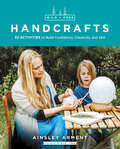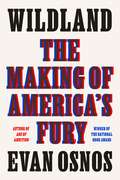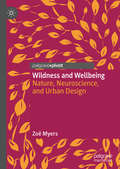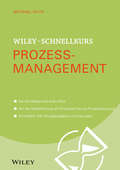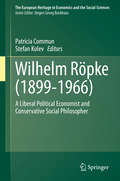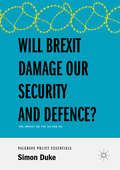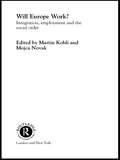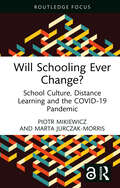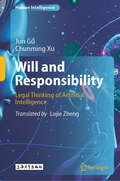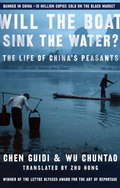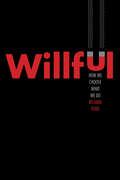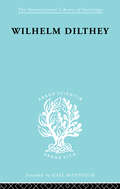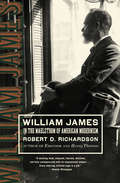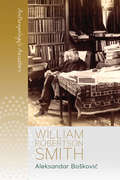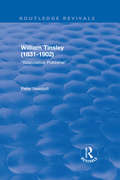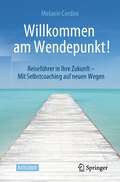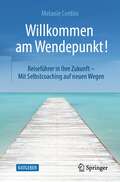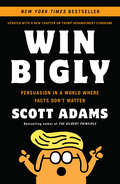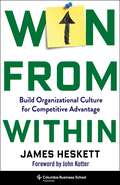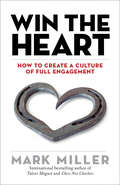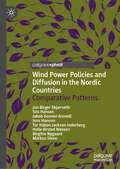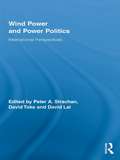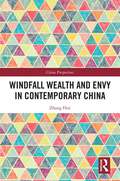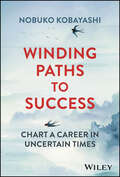- Table View
- List View
Wild and Free Handcrafts AFF: 32 Activities to Build Confidence, Creativity, and Skill (Wild and Free)
by Ainsley ArmentThe companion to The Call of the Wild + Free: styled in the lush aesthetic of the Wild + Free brand, a four-color book offering crafts, activities, and essays, that parents, educators, and caregivers can use to inspire their children.Wild + Free Handcrafts is a beautiful, four-color resource book for parents, educators, and caregivers to enjoy doing hands-on activities with kids. A handcraft engages one’s hands, requires a level of learned skill, encourages children to do their best work, and produces an end product that is useful. It has been used in homeschool settings for decades as one way to encourage them to work with their hands and discover a skillful craft they love to practice. It also is a great way for traditionally educated kids who are home for the summer, or in afterschool programs, or with their families on the weekends, to do fun activities that will stimulate their imaginations and creativity. This book will feature crafts such as:Felted acornsPaper beadsNature wreathsCocoa mint lip balmWoven willow hearts Finger knit bracelets Eco-dyed kitchen towels Fairy tale treehouse Flower crowns Bug hotel With the same lush photography as The Call of the Wild + Free, this book includes step-by-step pictures that show parents how to do the craft, and essays on the usefulness and purpose of handcrafts as a tool to spark children’s curiosity and wonder.
Wildland: The Making of America's Fury
by Evan OsnosINSTANT NEW YORK TIMES BESTSELLER <p><p> After a decade abroad, the National Book Award– and Pulitzer Prize–winning writer Evan Osnos returns to three places he has lived in the United States—Greenwich, CT; Clarksburg, WV; and Chicago, IL—to illuminate the origins of America’s political fury. <p><p> Evan Osnos moved to Washington, D.C., in 2013 after a decade away from the United States, first reporting from the Middle East before becoming the Beijing bureau chief at the Chicago Tribune and then the China correspondent for The New Yorker. While abroad, he often found himself making a case for America, urging the citizens of Egypt, Iraq, or China to trust that even though America had made grave mistakes throughout its history, it aspired to some foundational moral commitments: the rule of law, the power of truth, the right of equal opportunity for all. But when he returned to the United States, he found each of these principles under assault. <p><p> In search of an explanation for the crisis that reached an unsettling crescendo in 2020—a year of pandemic, civil unrest, and political turmoil—he focused on three places he knew firsthand: Greenwich, Connecticut; Clarksburg, West Virginia; and Chicago, Illinois. Reported over the course of six years, Wildland follows ordinary individuals as they navigate the varied landscapes of twenty-first-century America. Through their powerful, often poignant stories, Osnos traces the sources of America’s political dissolution. He finds answers in the rightward shift of the financial elite in Greenwich, in the collapse of social infrastructure and possibility in Clarksburg, and in the compounded effects of segregation and violence in Chicago. The truth about the state of the nation may be found not in the slogans of political leaders but in the intricate details of individual lives, and in the hidden connections between them. As Wildland weaves in and out of these personal stories, events in Washington occasionally intrude, like flames licking up on the horizon. <p><p> A dramatic, prescient examination of seismic changes in American politics and culture, Wildland is the story of a crucible, a period bounded by two shocks to America’s psyche, two assaults on the country’s sense of itself: the attacks of September 11 in 2001 and the storming of the U.S. Capitol on January 6, 2021. Following the lives of everyday Americans in three cities and across two decades, Osnos illuminates the country in a startling light, revealing how we lost the moral confidence to see ourselves as larger than the sum of our parts.
Wildness and Wellbeing: Nature, Neuroscience, and Urban Design
by Zoë MyersWildness and Wellbeing explores the dynamic relationships between urban nature and mental health, offering practical strategies for urban design. Mental health is a leading global issue and our urban environments can contribute to conditions such as depression and anxiety. Presenting the latest research, this book explores how neuroscience can offer new perspectives on the crucial role everyday multisensory interactions with nature can have on our mental wellbeing. These insights can help us (un)design our streets, neighbourhoods and cities, allowing nature to be integrated back into our cities. Wildness and Wellbeing is for anyone interested in the connections between urban ecology, health, environmental science, planning, and urban design, helping to create biodiverse cities for mental health.
Wiley-Schnellkurs Prozessmanagement
by Michael HuthWie beim Klöße essen, einer nach dem anderen. Ganz so einfach ist Prozessmanagement leider nicht. Aber richtig veranschaulicht, ist es oft auch nicht so schwer zu verstehen, wie es im ersten Moment scheint. Michael Huth führt Sie zügig in dieses Thema ein. Er erklärt, was Prozesse überhaupt sind, welche Bedeutung sie in Unternehmen haben und was die relevanten Begriffe sind. Danach wird das Phasenkonzept erläutert, die Prozessdokumentation, die Prozessbewertung, die Prozessoptimierung und einiges mehr. Zahlreiche Übungsaufgaben mit Lösungen helfen Ihnen, Ihr Wissen zu testen und zu festigen.
Wilhelm Reich, Biologist
by James E. StrickWilhelm Reich's experiments in the 1930s with cutting-edge light microscopy and time-lapse micro-cinematography were considered discredited, but not because of shoddy lab technique, as has been claimed. Scientific opposition to Reich's experiments, James Strick argues, grew out of resistance to his unorthodox sexual theories and Marxist leanings.
Wilhelm Röpke (1899–1966)
by Patricia Commun Stefan KolevThis volume provides a comprehensive account of Wilhelm Röpke as a liberal political economist and social philosopher. Wilhelm Röpke (1899-1966) was a key protagonist of transatlantic neoliberalism, a prominent public intellectual and a gifted international networker. As an original thinker, he always positioned himself at the interface between political economy and social philosophy, as well as between liberalism and conservatism. Röpke’s endeavors to combine these elements into a coherent whole, as well as his embeddedness in European and American intellectual networks of liberal and conservative thinkers, are a central theme throughout the book. The volume includes papers by international experts from a conference in Geneva on the occasion of the 50th anniversary of Röpke’s passing. The first part focuses on new biographical insights into his exile years in Istanbul and Geneva, while the second part discusses his business cycle theory in the context of the Great Depression, and the third part elaborates on his multifaceted social philosophy.Wilhelm Röpke was among the most important thinkers within the classical liberal revival post-WWII, with intriguing tensions between liberalism and conservatism. A highly recommended volume.–– Peter J. Boettke, 2016-2018 President of the Mont Pèlerin Society and Professor of Economics and Philosophy, George Mason University This important collection of papers provides an in-depth assessment of Wilhelm Röpke’s contributions, placing him in the context of his time. A fine contribution. –– Bruce J. Caldwell, Director of the Center for the History of Political Economy and Research Professor of Economics, Duke University
Will Brexit Damage our Security and Defence?: The Impact On The Uk And Eu
by Simon DukeThis Palgrave Policy Essential considers the security and defence consequences of Brexit for the UK and the European Union. It considers the place of security and defence in the debates leading up to the Brexit referendum as well as in its follow-up. Importantly, the book also traces recent developments in the EU towards what may become a European Defence Union and, in light of this, considers how realistic the UK’s aspirations for a unique relationship with the Union are. The book includes a critical analysis of the consequences of Brexit for crisis management, internal security and defence industries in the UK and EU. It concludes with an examination of the options and legal tools available to both parties as they frame their post-Brexit security and defence relations.
Will Europe Work?: Integration, Employment and the Social Order (Studies in European Sociology #Vol. 5)
by Martin Kohli Mojca NovakIn the post war years European integration was driven by nation states attempting to stimulate economic growth and social cohesion through European trade and cooperation. The results were prosperous, and unified Western European societies were based on full employment and redistributive welfare states. However, in today's Europe - a Europe subject to increasing international competition fuelled by both economic and cultural globalization - the European social model needs to be re-examined, yet its emphasis on cohesion remains crucial for the future of Europe as a unified polity. Investigating this issue in depth, this outstanding collection is divided into three key sections. These parts: * ask how recent developments have changed the old European model of employment and social protection, and outline a possible new European social model* focus on the questions of European identity and European borders, with special emphasis on cultural divisions such as ethnicity* concentrate on institutions such as citizenship and language, and reflect on sociology's ability to address European integration and the new European social order. Will Europe Work? brings together some of the leading names in European sociology to look at the construction of this new European social order through changing patterns of employment and Welfare and changing definitions of citizenship and identity.
Will Schooling Ever Change?: School Culture, Distance Learning and the COVID-19 Pandemic (Routledge Advances in Sociology)
by Piotr Mikiewicz Marta Jurczak-MorrisThis book is an insightful meta-narrative about schooling which explores the global natural experiment of the COVID-19 pandemic and its potential impact on school culture. The proposed book discusses how the abrupt and somewhat forced digital transformation of schooling on a global scale (caused by the COVID-19 pandemic) did not change the educational status quo. It states that online teaching and learning failed to transform the role of the key school actors, students and teachers as well as the relationship between them, despite megatrends such as digitalisation, automation and the development of artificial intelligence. This focus text discusses why the global experience of distance education did not translate into a significant qualitative change and provides a theoretical framework which enables the reader to interpret and explain the processes that occurred during distance education, as well as understand why extraordinarily little (if nothing) has changed in school culture. It will appeal to scholars and students from the sociology of education and from education studies, particularly those interested in school culture, innovation in education, online teaching and learning, curriculum studies and education policy.
Will and Responsibility: Legal Thinking of Artificial Intelligence (Human Intelligence)
by Chunming Xu Jun GuThis book explores the authors' legal thinking on artificial intelligence (AI), a topic of burgeoning interest in the technology sector and among the general public. As part of the Human Intelligence book series, it primarily addresses the legislative and philosophical challenges posed by AI technology. A key philosophical concern discussed is the implications of AI surpassing human intelligence in certain domains, particularly the definition of rights and responsibilities for robots. Without clear resolutions to these issues, the deployment of AI technology may face significant hurdles. The book covers various aspects, including the legal recognition of robots as rights-holders, strategies for implementing these rights, assigning responsibilities to robots, intellectual property rights for robotic inventions, personality rights for companion robots, and an evaluation of the pros and cons of a binary legal system.
Will the Boat Sink the Water?: The Life of China's Peasants
by Chen Guidi Wu ChuntaoA prize-winning investigative expos(r) of the poverty and injustice experienced by China's 900 million peasants, told through a series of dramatic personal narratives.
Willful: How We Choose What We Do
by Richard RobbA revelatory alternative to the standard economic models of human behavior that proposes an exciting new way to understand decision‑making Why do we do the things we do? The classical view of economics is that we are rational individuals, making decisions with the intention of maximizing our preferences. Behaviorists, on the other hand, see us as relying on mental shortcuts and conforming to preexisting biases. Richard Robb argues that neither explanation accounts for those things that we do for their own sake, and without understanding these sorts of actions, our picture of decision‑making is at best incomplete. Robb explains how these choices made seemingly without reason belong to a realm of behavior he identifies as &“for‑itself.&” A provocative combination of philosophy and economics that offers a key to many of our quixotic choices, this groundbreaking volume provides a new way to understand everything from investing to how hard we work to how we manage daily interactions.
William Dilthey (International Library of Sociology #Vol. 22)
by M. A. HodgesFirst Published in 1998. Routledge is an imprint of Taylor & Francis, an informa company.
William James: In the Maelstrom of American Modernism
by Robert D. RichardsonThe definitive biography of the fascinating William James, whose life and writing put an indelible stamp on psychology, philosophy, teaching, and religion—on modernism itself. Often cited as the &“father of American psychology,&” William James was an intellectual luminary who made significant contributions to at least five fields: psychology, philosophy, religious studies, teaching, and literature. A member of one of the most unusual and notable of American families, James struggled to achieve greatness amid the brilliance of his theologian father; his brother, the novelist Henry James; and his sister, Alice James. After studying medicine, he ultimately realized that his true interests lay in philosophy and psychology, a choice that guided his storied career at Harvard, where he taught some of America&’s greatest minds. But it is James&’s contributions to intellectual study that reveal the true complexity of man. In this biography that seeks to understand James&’s life through his work—including Principles of Psychology, The Varieties of Religious Experience, and Pragmatism—Robert D. Richardson has crafted an exceptionally insightful work that explores the mind of a genius, resulting in &“a gripping and often inspiring story of intellectual and spiritual adventure&” (Publishers Weekly, starred review). &“A magnificent biography.&” —The Washington Post
William Robertson Smith (Anthropology's Ancestors #2)
by Aleksandar BoškovićWilliam Robertson Smith’s influence on anthropology ranged from his relationship with John Ferguson McLennan, to advising James George Frazer to write about “Totem” and “Taboo” for the Encyclopaedia Britannica that he edited. This biography places a special emphasis on the notes and observations from his travels to Arabia, as well as on his influence on the representatives of the “Myth and Ritual School.” With his discussion of myth and ritual, Smith influenced generations of scholars, and his insistence on the connection between the people, their God, and the land they inhabited inspired many of the concepts later developed by Émile Durkheim.
William Tinsley (1831-1902) (1831-1902) (1831-1902) (1831-1902): Speculative Publisher: Speculative Publisher
by Peter NewboltThis title was first published in 2001. An account of the activities of 19th-century publisher William Tinsley, particularly in relation to his authors and his chosen way of making a living. In considering the library-publishing system that dominated all aspects of fiction in the latter part of the 19th century, when down-payments rather than loyalties were the rewards of novelists, it may be surprising to find how wide were the variations in prices that publishers paid for such work. Differences appeared when individual publishers developed soft spots for particular authors, and in consequence they sometimes made fools of themselves. William Tinsley certainly did so, on several occasions, but was blessed, at least in later life, with the grace of never seriously regretting any of his mistakes. Examples of the nature of this good-hearted man are found in these pages. This account relies to an extent on Tinsley's two volumes of memoirs.
Willkommen am Wendepunkt!: Reiseführer in Ihre Zukunft – Mit Selbstcoaching auf neuen Wegen
by Melanie CordiniDieses Buch ist ein Reiseführer in Ihre Zukunft und zu Ihnen selbst!Wir alle erleben Wendepunkte. Sie sind zeitlos, weil sie zum Leben gehören. Sie sind Weichen, die über unsere Zukunft entscheiden, beruflich und privat. Welche Rolle spielt unser Innenleben am Wendepunkt? Woher kommen Schuld- und Angstgefühle? Welche Rolle spielen soziale Normen, Bauchgefühl, inneres Team und Glaubenssätze?Was lernen wir aus typischen Wendepunkten wie Familiengründung, Ruhestand, Schulabschluss oder privater Trennung? Wie helfen uns Krankheitssymptome glücklicher zu werden? Wie gewinnen wir eine positive Lebenseinstellung?Treffen Sie Ihre Wahl sowohl mit sachlichem Abstand als auch mit emotionaler Tiefe. Befreien Sie sich von unnötigem Ballast auf Ihrem Weg! Hinterfragen Sie Beweggründe und Ziele und finden Sie Ihr individuelles Lösungsmuster. Sie können mehr beeinflussen als Sie glauben!Dieser Ratgeber liefert alle erforderlichen Informationen für Ihre Wendepunkte, sortiert Ihr emotionales Gepäck und gibt unterhaltsam Empfehlungen für die optimale Reiseroute. In vielen Stories und humorvollen Beispielen aus dem Leben der Autorin und ihrer Coaching-Praxis werden Sie sich wiederfinden. Als Proviant für den Weg erhalten Sie zusätzlich den passenden Reise-Soundtrack, Ihr Trainings-Camp mit Praxisübungen sowie den Schnelldurchlauf aller Kapitel in handlichen Reisenotizen.
Willkommen am Wendepunkt!: Reiseführer in Ihre Zukunft – Mit Selbstcoaching auf neuen Wegen
by Melanie CordiniDieses Buch ist ein Reiseführer in Ihre Zukunft und zu Ihnen selbst!Wir alle erleben Wendepunkte. Sie sind zeitlos, weil sie zum Leben gehören. Sie sind Weichen, die über unsere Zukunft entscheiden, beruflich und privat. Welche Rolle spielt unser Innenleben am Wendepunkt? Woher kommen Schuld- und Angstgefühle? Welche Rolle spielen soziale Normen, Bauchgefühl, inneres Team und Glaubenssätze?Was lernen wir aus typischen Wendepunkten wie Familiengründung, Ruhestand, Schulabschluss oder privater Trennung? Wie helfen uns Krankheitssymptome glücklicher zu werden? Wie gewinnen wir eine positive Lebenseinstellung?Treffen Sie Ihre Wahl sowohl mit sachlichem Abstand als auch mit emotionaler Tiefe. Befreien Sie sich von unnötigem Ballast auf Ihrem Weg! Hinterfragen Sie Beweggründe und Ziele und finden Sie Ihr individuelles Lösungsmuster. Sie können mehr beeinflussen als Sie glauben!Dieser Ratgeber liefert alle erforderlichen Informationen für Ihre Wendepunkte, sortiert Ihr emotionales Gepäck und gibt unterhaltsam Empfehlungen für die optimale Reiseroute. In vielen Stories und humorvollen Beispielen aus dem Leben der Autorin und ihrer Coaching-Praxis werden Sie sich wiederfinden. Als Proviant für den Weg erhalten Sie Ihr Trainings-Camp mit Praxisübungen sowie den Schnelldurchlauf aller Kapitel in handlichen Reisenotizen.
Win Bigly: Persuasion in a World Where Facts Don't Matter
by Scott Adams"If you watched the entire election cycle and concluded that Trump was nothing but a lucky clown, you missed one of the most important perceptual shifts in the history of humankind. I'll fix that for you in this book." Adams was one of the earliest public figures to predict Trump’s win, doing so a week after Nate Silver put Trump’s odds at 2 percent in his FiveThirtyEight.com blog. The mainstream media regarded Trump as a novelty and a sideshow. But Adams recognized in Trump a level of persuasion you only see once in a generation. Trump triggered massive cognitive dissonance and confirmation bias on both the left and the right. We’re hardwired to respond to emotion, not reason. We might listen to 10 percent of a speech—a hand gesture here, a phrase there—and if the right buttons are pushed, we decide we agree with the speaker and invent reasons to justify that decision after the fact. The point isn’t whether Trump was right or wrong, good or bad. Win Bigly goes beyond politics to look at persuasion tools that can work in any setting—the same ones Adams saw in Steve Jobs when he invested in Apple decades ago. For instance: · If you need to convince people that something is important, make a claim that’s directionally accurate but has a big exaggeration in it. Everyone will spend endless hours talking about how wrong it is and will remember the issue as high priority. · Stop wasting time on elaborate presentation preparations. Inside, you’ll learn which components of your messaging matter, and where you can wing it. · Planting simple, sticky ideas (such as “Crooked Hillary”) is more powerful than stating facts. Just find a phrase without previous baggage that grabs your audience at an emotional level. Adams offers nothing less than “access to the admin passwords to human beings.” This is a must read if you care about persuading others in any field—or if you just want to resist the tactics of emotional persuasion when they’re used on you.
Win from Within: Build Organizational Culture for Competitive Advantage
by James HeskettThere is significant evidence that an effective organizational culture provides a major competitive edge—higher levels of employee and customer engagement and loyalty translate into higher growth and profits. Many business leaders know this, yet few are doing much to improve their organizations’ cultures. They are discouraged by misguided beliefs that an executive’s tenure and an organization’s attention span are too short for meaningful transformation.James Heskett provides a roadmap for achievable and fast-paced culture change. He demonstrates that an effective culture supplies the trust that makes managing change of all kinds easier. It provides a foundation on which changes in strategy can be based, and it’s a competitive edge that can’t easily be hacked or copied. Examining leading companies around the world, Heskett details how organizational culture makes employees more loyal, more productive, and more creative. He discusses how to quantify its effects in order to sell the notion of culture change to the organization and considers how to preserve an organization’s culture in the face of the trend toward remote work hastened by the COVID-19 pandemic. Showing how leadership can bring about significant changes in a surprisingly short time span, Win from Within offers a playbook for developing and deploying culture that enables outsized results. It is a groundbreaking demonstration of organizational culture’s role as a foundation for strategic success—and its measurable impact on the bottom line.
Win the Heart: How to Create a Culture of Full Engagement (The\high Performance Ser. #4)
by Mark MillerEvery great company has an engaged workforce, and nurturing a culture of engagement is at the heart of great leadership—employees who really care about their work, their coworkers, and the organization can supercharge a company's success. But for many years, engagement has been suffering. Gallop reports that 70 percent of employees are not fully engaged on the job. Mark Miller draws on more than forty years of leadership experience to show leaders at all levels how to change the conversation and create real competitive advantage in the process.In the fourth book in Miller's High Performance Series, CEO Blake Brown sets out to discover how to create the kind of workplace where everyone feels excited to come to work, passionate about what he or she brings to the company, and energized at the end of the day. It's a journey that takes him literally all over the world—from Italy to Greece to Green Bay and more. What he discovers from the pages of history is as relevant as the evening news. Engagement unleashes untapped potential buried deep within the hearts of your people. An engaged workforce is more creative, more driven, and more enthusiastic about reaching company goals. If you put the lessons in this book to work, your people will never look at work, or their leaders, the same way again.
Wind Power Policies and Diffusion in the Nordic Countries: Comparative Patterns
by Tor Håkon Inderberg Jon Birger Skjærseth Jakob Donner-Amnell Teis Hansen Jens Hanson Helle Ørsted Nielsen Birgitte Nygaard Markus SteenThis book focuses specifically on policy mixes and wind power diffusion in four Nordic countries – Denmark, Finland, Norway and Sweden. Although these Nordic welfare states have much in common, they have adopted different wind power policies and experienced dissimilar diffusion trajectories. Understanding these patterns across the Nordic countries is the central puzzle that this book investigates. Empirically, this book provides a first-of-its-kind comparative study of wind power policies in the Nordic countries. Analytically, the authors contribute to the transition policy mix literature, which remains largely insensitive to political feasibility. This book will be of interest to researchers and students as well as private and public decision makers looking for tools to enable the energy transition.
Wind Power and Power Politics: International Perspectives (Routledge Studies in Science, Technology and Society)
by David Peter David Toke Strachan LalThe aim of the book is to analyse the factors that have influenced wind power outcomes in a range of countries which have featured significant wind power deployment programmes. A central theme is the relationship between patterns of ownership and the outcomes. These flow from different social environments, but they are associated with different types of planning outcome and deployment rates. Grass roots ownership is more widespread than is commonly thought, although it is not a panacea for effective wind power programmes. Financial policies used to promote wind power also have important influences of the rates of deployment. However, what seems to be most important for wind power deployment is a double coincidence of widespread social support for wind power deployment and effective financial support systems for wind power.
Windfall Wealth and Envy in Contemporary China (China Perspectives)
by Zhang HuiThis groundbreaking study examines the cultural manifestations of envy in China during the 1980s, 1990s and 2000s, a period of unprecedented economic and social change.China’s rapid accumulation of wealth – particularly its uneven distribution, which created overnight millionaires alongside those left behind – provides anthropologists with a unique opportunity to test theories of envy as a fundamental human emotion. Unlike traditional societies, where established cultural mechanisms such as witchcraft, sorcery or the ‘evil eye’ help to manage envy, China offers a unique case study. Based on extensive fieldwork in northern Chinese villages between 2006 and 2008, the author explores how sudden mining wealth has triggered various envy-related discourses and practices and reveals how these wealth disparities have reshaped social dynamics and moral landscapes. The study examines cultural expressions of envy, public discourses of malicious envy, the everyday contexts that shape envy and its social impact, the moral codes that govern the envied and their defensive strategies, and how families understand the ethics of success and failure. Through this lens, she illuminates a local moral world amidst one of humanity's most profound social transformations.This book will be an essential reference for anthropologists, sociologists, scholars and students of contemporary Chinese society, ethnography and the anthropology of emotions.
Winding Paths to Success: Chart a Career in Uncertain Times
by Nobuko KobayashiAn inspirational compilation of stories from successful Japanese professional women In Winding Paths to Success: Chart a Career in Uncertain Times, experienced management consultant Nobuko Kobayashi delivers an engaging and insightful discussion of the professional and personal successes of senior Japanese women executives, academics, and entrepreneurs who started their career in the late ‘80s to ‘90s, the dawn of gender equity at work in Japan. You’ll discover how these remarkable people carved out a long and rewarding career in a challenging environment. The author describes the substantial diversity of Japanese professional life, exploring the rich and varied histories of women who are often stereotyped and relegated to a one-size-fits-all story. Their creative navigation amid uncertainties inspires anyone who wishes to establish a career in the highly volatile world of today. You’ll also find: Personal and forthcoming stories from women executives Recommendations for public and private sector employers to further enhance diversity and inclusiveness in the workplace Individual strategies for crafting successful careers from a minority positionPerfect for those building a career, managers, executives, entrepreneurs, founders, and other business leaders, Winding Paths to Success is a must-have resource for aspiring and practicing business leaders in Japan and other countries.
